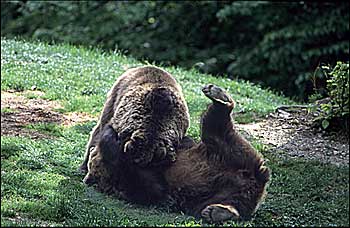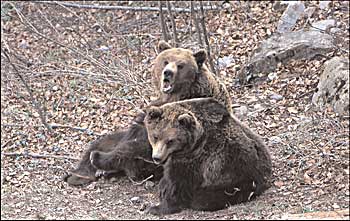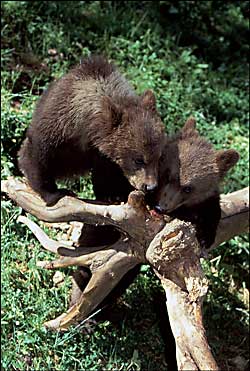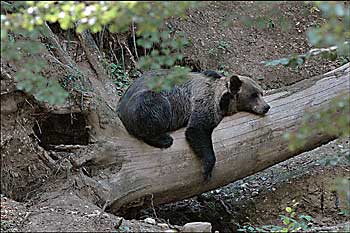Bear and alpine tradition
but also bear and survival for the man
 |
Following human
social and cultural developments during history, bears have
been considered harmful and dangerous animals, enemies for
humans and even a threat to our supremacy over nature, before
actually transforming themselves into the icons of wilderness,
in a tortuous path at the end of which the species has become
the emblem of the renewed relationship with the environment.
The relationship between men and bears is therefore changeable,
and has transformed itself, through technology and the invention
of firearms, into a forced coexistence first and later into
a real massacre.
Only deep social and economical changes, started during the
second post-war period, and the cultural |
metamorphosis that has followed, have
allowed us to understand the importance of the bear.In such
a context in 1996, in order to avoid the extinction of the
last authochtonous population of bears on the Italian Alps,
which were relegated in the Eastern part of Brenta Dolomites
(Western Trentino) and reduced to no more than 3 examples,
through the EU Life financial supports, an ambitiuos intervention
of safeguarding for the brown bear has eventually started.
The project, called Life Ursus, has been sponsored by Adamello
Brenta Natural Park and and carried out in collaboration with
the Autonomous Province of Trento and the National Institute
for the Wild Fauna: it is based on the release of 10 individuals
from Slovenia, trying to rebuild, in the medium-long run,
a vital population of bears on the central part of the Alps. |
|
Within the
project, many other useful events have been realized, for
example campaigns for the residents in order to strengthen
public awareness, promote a deep knowledge of the issue for
those who work in the camps' activities and an adjustment
of the law-frame for the prevention and compensation of the
damages. As in the predictions, the reintroduced bears have
perfectly adapted themselves to the new vital area: according
to the data gathered through the monitoring activities led
by Adamello Brenta Natural Park and by the Autonomous Province
of Trento (the legal institution in charge of the species
on the provincial territory) has been possible to establish
an evident growth in number and a territorial expansion of
the nucleus of brown bears returned to live the central portion
of the Alps. The Brenta bear population is actually esteemed
in more than 20 examples, thanks to the 8 reproductive events
verified occured in the last five years (for a total of 20
baby-bears born altogether in Trentino). If from a side the
success of the operation of reintroduction is also confirmed
by the enlargement of attendance areas - on the other the
species hasn't been confined within the sole Western Trentino,
but its areal is expanding more and more, both towards North
and South; the recent explorations of some bears across the
Italian border underline the difficulties that the brown bears
meet in the process of recolonization of all those suitable
areas because the "social and political habitat"
is not yet sufficiently proportionate to their actual needs. |
 |
|
The future of bears on the Alpine chain depends on the
possibility of connecting the different family units now
present in Trentino, Friuli, Austria and Slovenia. It appears
as the priority today the search of new forms of cooperation
among authorities and territorialy competent administrations
, that will be able to adjust and share forms of sustainable
coexistence, promoting the acceptance of bears and a sense
of responsibility especially among the resident people.
It is thus quite desiderable that a true "culture of
the bear" could develop, even outside Trentino, where
the criteria of the conservation chosen by the Adamello
Brenta Natural Park and by the Autonomous Province of Trento
have led local people to ponder forms of life that will
allow them to coexist with the bear. We are becoming aware,
in other words, of the ecological, cultural and legal factors
that make the brown bear a very peculiar species. To safeguard
the bear, distinguished by ecological requests and wide
vital spaces means, in the first place, safeguarding the
environment with its biodiversities.
The importance of bears lays, maybe even more than anywhere
else, in what the brown bear represents for history and
human traditions. Its presence in human culture has indeed
very deep and ancient roots, that had followed social and
cultural developments through to our times. The bear is
near men already from the beginning of civilization, as
it is witnessed in the rock paintings of the Chauvet Cave
in Pont d'Arche, France; to the bear are linked numberless
rites, myths and legends that proceed from the Hellenic,
Celtic and Germanic cultures, passing through Beowulf, and
the Chançon de Roland.
The brown bear holds also a special place in the ancient
fairy-tales, in a continuous itinerary that makes it transform,
in more recent times, into a cartoon and a teddy-bear, and
symbolic protagonist the publicity.
The estinction of the bear, therefore would lead to an undoubted
cultural impoverishment to the disappearance of a crucial
protagonist in the history of mankind, like it would be
the destruction of a work of art or of a monument.
Next to the ethical motivations, another important reason
does exist and it is meant to protect, safeguard, "guarantee
the state of conservation" of such a species: the legal
context in which we live.
The brown bear is - as a matter of fact - an extremely peculiar
and relevant species in Europe, as it has been confirmed
by the numerous laws, EU and national policies on the safeguarding
of biodiversities.
After all, laws are nothing but the expression of human
culture.
|
 |

A valley where the bears live, you don't need to be a
poet to understand, is more beautiful than a valley without
it. Than the survival of this magnificent character is not
only a bare faunistic data, but legend, adventure, prosecution
of an extremely ancient life, that once ceased, will make
us feel poorer and belittled.
Dino Buzzati
|
|
